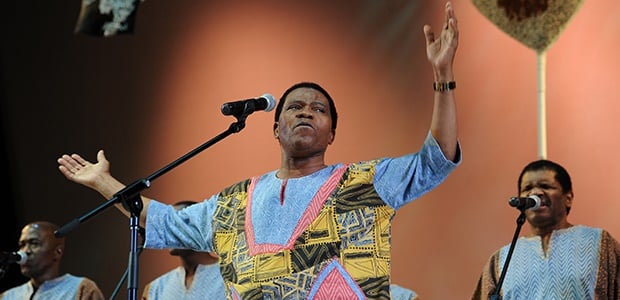
Pieter du Toit, News24’s Assistant Editor for in-depth news, takes a look at Joseph Shabalala’s impactful career and how Ladysmith Black Mambazo’s music became the soundtrack to a country in transition.
OPINION
It opens with Joseph Shabalala’s haunting voice, soaring in the dark across the bitterly cold, unforgiving Highveld of apartheid South Africa in the dead of winter.
Emaweni webaba
Silale maweni
Webaba silale maweni
Webaba silale maweni
Webaba silale maweni
Webaba silale maweni
Webaba silale maweni
Webaba silale maweni
Webaba silale maweni
Webaba silale maweni
Webaba silale maweni
He is then joined by the rest of Ladysmith Black Mambazo, the group he founded in 1971 after a dream in which he saw a group of boys hovering in the air between a stage and the sky, harmonising in traditional Zulu style.
Homeless, homeless
Moonlight sleeping on a midnight lake
Homeless, homeless
Moonlight sleeping on a midnight lake
And we are homeless, we are homeless
The moonlight sleeping on a midnight lake
And we are homeless, we are homeless
The moonlight sleeping on a midnight lake
It's only later in Homeless, a signature track on the timeless and groundbreaking masterpiece album Graceland that Shabalala and Ladysmith Black Mambazo is joined by Paul Simon, who achieved his greatest success post Simon & Garfunkel with its release in August 1986.
Homeless is a jarring, but hauntingly beautiful glimpse into the life of homeless – and then, stateless – black South Africans. It tells of being afraid of sleeping without shelter, of cold winds sweeping empty streets and the despair of hopelessness.
Shabalala, whose father was a miner on the Rand and who only saw his family every six months, channeled South African life under apartheid into Ladysmith Black Mambazo’s lyrics, and their collaboration with Simon on Graceland became part of the soundtrack of a country in transition.
His death, on the thirtieth commemoration of Nelson Mandela’s release from incarceration, is a desperately sad reminder of the passing of a generation who helped midwife a wounded country and a divided nation.
And it comes shortly after the death of Johnny Clegg, another musician who performed with Shabalala and his group who also helped craft the sound of a time and place in our history which offered so much hope and vibrancy.
Shabalala and Ladysmith Black Mambazo shot to international fame on the back of Simon’s Graceland, their harmonising, mixed with township sounds and African blues helping to make the album one of the most celebrated of all time. And for Shabalala and his crew, it provided a platform from which they achieved global stardom, winning Grammy after Grammy in recognition of their talent.
In 1995 they performed an emotional rendition of World in Union alongside PJ Powers when then president Nelson Mandela emerged from the tunnel at Ellis Park to be introduced to the Springboks before the final of that famous Rugby World Cup. Shabalala, broad shouldered and broad smiled, led Ladysmith in belting out a song which came to symbolise those halcyon moments.
Graceland was a political album as much as it was a work of art. Simon was roundly criticised for breaking the cultural boycott to travel to South Africa to record some of the songs. Many in the ANC lambasted him, including Dali Tambo, who was head of the global movement Artists Against Apartheid at the time. But Simon dismissed it, saying that he was on the side of the artists, and that he wanted to bring South African sounds to the world, not perform in the country.
"My new album really came about by accident. In the summer of 1984, a friend of mine gave me a tape of 'township jive,' the street music of Soweto, South Africa. It was a happy instrumental music that reminded me of 1950's rhythm and blues, which I have always loved.
"By the end of the summer I was scat-singing melodies over the tracks. I thought that the group, whoever it was, would be interesting to record with. And so I went on a search to find out who they were and where they came from," Simon told The New York Times in August 1986.
He immediately took a liking to Shabalala’s group. He flew to Johannesburg, met them (as well as other black artists, such as guitarist Ray Phiri), made music with them and took them back to New York.
Strong wind destroy our home
Many dead, tonight it could be you
Strong wind, strong wind
Many dead, tonight it could be you
And we are homeless, homeless
Moonlight sleeping on a midnight lake
And we are homeless, homeless
Moonlight sleeping on a midnight lake
Homeless, homeless
Moonlight sleeping on a midnight lake
Somebody say ih hih ih hih ih
Somebody sing hello, hello, hello
Somebody say ih hih ih hih ih
Somebody cry why, why why?
Somebody say ih hih ih hih ih
Somebody sing hello, hello, hello
Somebody say ih hih ih hih ih
Somebody cry why, why why?
Somebody say ih hih ih hih ih
Graceland was brimful with South African sounds. Besides guitarist Phiri and drummer Isaac Mtshali, the Boyoyo Boys, General M. D. Shirinda and the Gaza Sisters also appeared.
If Homeless is a melancholy song about the realities of South Africa in a time of states of emergency, violence and fear, it's on Diamonds on the Soles of her Shoes where the musical talents of Shabalala and his friends combine to create an orchestra of uplifting African rhythm and sounds.
Phiri (lead guitar) and Bakithi Kumalo (bass) is in a rhythmic class of their own, and Shabalala and Ladysmith Black Mambazo provide the mesmerising backdrop to Simon’s tale of a rich girl and a poor boy.
(a-wa) O kod wa u zo-nge li-sa namhlange
(a-wa a-wa) Si-bona kwenze ka kanjani
(a-wa a-wa) Amanto mbazane ayeza
She’s a rich girl
She don’t try to hide it
Diamonds on the soles of her shoes
He’s a poor boy
Empty as a pocket
Empty as a pocket with nothing to lose
Sing, Ta na na
Ta na na na
She got diamonds on the soles of her shoes
Ta na na
Ta na na na
She got diamonds on the soles of her shoes
In 1992 Simon took his Graceland tour to South Africa, two years after Mandela’s release. And although there was some protest against an international artist of his stature performing in a then pre-democracy South Africa, the tour was an enormous success, playing out in front of packed crowds in Johannesburg and Cape Town.
In January 1992 The New York Times reported: "His show broke new ground in exposing the mostly white audience to their country's premier black musicians like the guitarist Ray Phiri and the choral group Ladysmith Black Mambazo. Most whites were ignorant of such artists before Mr. Simon included them in his 1986 Graceland album, which is rooted in the lively mbaqanga and mbube strains of South African township jive. Mr. Simon said he wanted the black musicians to 'be afforded the respect and admiration in this country that they've gotten around the world.'
"Mr. Simon also delighted the crowd by bringing Miriam Makeba, who returned last year from self-imposed exile, onstage to sing a song with him. And they cheered when he hugged Joseph Tshabalala (sic), the leader of Ladysmith Black Mambazo."
Shabalala and Ladysmith Black Mambazo, care of Simon’s Graceland, was indeed the first introduction many white South Africans had to music other than what they knew. They were strange rhythms, the melodies and harmonising, the lyrical stories it told about a country beyond apartheid and beyond hate. But what grand sounds they were, singing of peoples and stories and places that seemed to be from another world, a world of love and myths and warmth.
Shabalala and Ladysmith Black Mambazo’s later fame arguably outshone their contribution to Graceland.
But it was thanks to them that it became the soundtrack to a country in transition and to represent the best we could become.
Hamba kahle, Joseph Shabalala.
Kulumani
Kulumani, Kulumani sizwe
Singenze njani
Baya jabula abasi thanda yo
Ho




 Publications
Publications
 Partners
Partners















